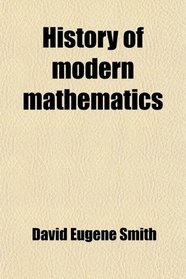Search -
History of modern mathematics
History of modern mathematics
Author:
Purchase of this book includes free trial access to www.million-books.com where you can read more than a million books for free. This is an OCR edition with typos. Excerpt from book: IRRATIONAL AND TRANSCENDENT NUMBERS. 13 To Gauss is also due the representation of numbers by binary quadratic forms. Cauchy, Poinsot (1845), Lebesque (1859, ... more »
Author:
Purchase of this book includes free trial access to www.million-books.com where you can read more than a million books for free. This is an OCR edition with typos. Excerpt from book: IRRATIONAL AND TRANSCENDENT NUMBERS. 13 To Gauss is also due the representation of numbers by binary quadratic forms. Cauchy, Poinsot (1845), Lebesque (1859, ... more »
ISBN-13: 9780217223584
ISBN-10: 0217223583
Publication Date: 8/9/2009
Pages: 116
Rating: ?
ISBN-10: 0217223583
Publication Date: 8/9/2009
Pages: 116
Rating: ?
0 stars, based on 0 rating




